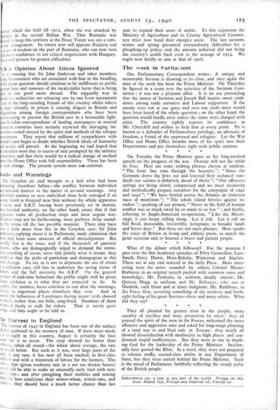aids and Warnings The Croydon air raid brought to a
boil what had been mmering elsewhere before—the conflict between individual d national interest in the matter of air-raid warnings. Any dividual anxious to save individual .skins feels outraged if an emy bomb is dropped near him without the whole apparatus sirens and A.R.P. having been previously set in motion. ny national authority, on the other hand, aware that if that paratus starts all production stops and most urgent war- liveries may not be forthcoming, must perforce delay sound- g the sirens till the last possible moment. There may have en a little more than this in the Croydon case; Sir John derson, replying about it in Parliament, made admission that ere had been some measure of official misjudgement. But madly that is the issue, and if the thousands of patriotic tizens, who are demagogically urged to demand the imme- ate sounding of sirens, were told plainly what it meant, they ould see that the paths of patriotism and demagogism at this nt diverge. To say so is not to deprecate the use of sirens a sufficient case, still less to underrate the saving virtue of titers and the full necessity for A.R.P. On the general estion of raid-time behaviour the public might well be given carer guidance as to what they are expected to do. In .ondon, for instance, buses continue to run after the warnings, tuer,:as in important places elsewhere they stop. And in leneral the behaviour of Londoners during recent raids showed 00 much, rather than too little, sang-froid. Numbers of them ontinued freely to walk the streets. That is surely quite rmng, and they ought to be told so.






























 Previous page
Previous page